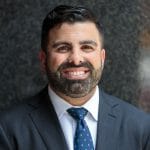Retired UTU Designated Legal Counsel (DLC) David B. Kiker, 70, died Saturday, Sept. 2. An attorney for the law firm Rossi, Cox, Kiker & Inderwish in Aurora, Colo., Kiker served as DLC until his retirement in 2003.
Kiker is survived by his wife of 45 years, Pamela Seale; three natural children, John (Jennifer) Kiker, Chris (Kate) Kiker and Polly (Spencer) Gilligan; embraced children, Ashley (Roy) Sakker and Turner (Angela) Lang; mother, Dorothy Kiker; sister, Kelly (Keith) Beitler; sister, Emily Kiker; 11 grandchildren and many other family and friends. He was preceded in death by his father, George Kiker; birth mother, Shirley Kiker; grandmother, Alma Webb; and his aunt, Jane Webb.
Funeral services will be held Friday, Sept. 8, at 11 a.m. at the Littleton Church of Christ, 6495 South Colorado Blvd., Centennial, CO 80121.
In lieu of flowers, memorial contributions may be made to The Adoption Exchange, 14232 East Evans Ave., Aurora, CO 80014; The Barbara Davis Center for Childhood Diabetes, 1775 Aurora Ct., Aurora, CO 80045; or to any animal cause of your choice.
Click here to read Kiker’s full obituary or to leave condolences for the family.
Tag: DLC
If you are injured on the job, you have powerful rights under the Federal Employers’ Liability Act (FELA). All of SMART TD’s Designated Legal Counsel (DLC) are chosen because they specialize in handling FELA claims and are experienced in dealing with railroad claim agents and railroad lawyers.
A SMART TD DLC is your agent, and their job is to represent you. They are on your side.
SMART Transportation Division has added two lawyers to our DLC teams: Michael C. Terranova and Andrew J. Thompson.
Michael C. Terranova is the grandson of a Union City laborer and the son of a union sheet metal worker. He went to law school at the Chicago Kent College of Law where he focused on labor and employment law. While in law school, Terranova learned the ins and outs of the Railway Labor Act, National Labor Relations Act and FELA. He also worked for a law firm that was involved with collective bargaining agreements and helped injured union workers. Since being admitted to practice law, Terranova has focused his practice on representing injured union workers. He is a member of the Academy of Rail Labor Attorneys (ARLA) and currently works for the Cogan & Power, P.C. law firm in Chicago.
Members can contact Terranova by calling 312-477-2500 or via email at mterranova@coganpower.com.
To learn more about Terranova, visit www.coganpower.com.
Andrew J. Thompson’s inspiration for advocating on behalf of railroad workers began generations ago, as his great-grandparents, grandparents and many extended family members worked on the railroad and were active in rail unions. He obtained a political science degree, followed by a law degree from Case Western Reserve University. He began working at the Chattman, Gaines & Stern, L.P.A., law firm where he learned the nuances of railroad law and sharpened his skills as a trial attorney. Thompson has successfully handled railroad cases in state and federal courts in Ohio, New Jersey, Pennsylvania, West Virginia, Florida and Illinois. He has experience handling union labor matters under FELA, the Federal Rail Safety Act (FRSA), Railway Labor Act and the National Labor Relations Act. Thompson also has experience with negotiating collective bargaining agreements, handling grievances before a Public Law Board, and arguing cases in arbitration.
Thompson regularly takes time to attend union meetings and other functions to speak to railroad employees about their legal rights. He is a member of the ARLA and practices law with the Shapero & Roloff Co., L.P.A. in Cleveland.
Members can contact Thompson by calling 216-781-1700, toll-free 800-321-9199; or via email at athompson@shaperoroloff.com.
To learn more about Thompson, visit www.shaperoroloff.com.

Designated Legal Counsel (DLC) Anthony Petru has been chosen as coordinator of the DLC Program. Petru replaces long-time DLC member and Coordinator Steve Young, who retired earlier this autumn.
Petru is a long-time DLC with years of experience in the rail industry. He graduated from University of California, Berkeley, and attended law school at the University of San Francisco. He joined the law firm of Hildebrand, McLeod & Nelson in 1980. Petru is a member of the American Trial Lawyers Association and the Academy of Rail Labor Attorneys.
“We appreciate Anthony’s willingness to serve as coordinator and look forward to working with him in his new position,” said Transportation Division President John Previsich.

Meanwhile, Previsich lauded Young’s service to our membership. “Steve’s contribution to the DLC program while serving as coordinator cannot be overstated, nor can his many other contributions to the union overall. Steve has been of great service to this union for over 40 years, beginning with holding office at the local and general committee level through his continued affiliation during his professional career. His contribution to the education and training of our members through his presentations at our regional meetings is legendary. Steve’s presence and leadership will be missed.”
Members can reach Petru by calling (800) 447-7500, visiting his website www.hmnlaw.com or by visiting our Designated Legal Counsel pages.
John J. Naughton, former associate designated legal counsel of the Brotherhood of Railroad Trainmen and United Transportation Union, died Oct. 29, 2015.
Naughton fought for the rights of railroad and other transportation workers as an employee of the former firm of Henslee, Monek & Henslee. As a part of the firm, Naughton argued before the U.S. Supreme Court several times to secure the right of rail labor organizations to have DLC programs and inform the members of their rights under the various laws affecting rail labor.
Naughton is survived by daughter Nora Naughton; son Thomas (Tracey) Naughton; grandchildren Kevin, Margaret and John; sisters Mary Naughton and Dorothy Naughton and many others. He was preceded in death by his wife Vivian T. Moore and by his brother Tom Naughton.
Click here to view Naughton’s obituary or to leave condolences.
WASHINGTON — In a 5-4 decision, the Supreme Court June 23 declined to tighten the standard of proof injured rail workers must demonstrate to win an award under the Federal Employers’ Liability Act (FELA).
The ruling is a significant victory for injured rail workers.
The FELA — a railroader’s most cherished workplace safety assurance — was passed by Congress more than a century ago to make railroads liable if an employee injury or death results “in whole or in part” from the negligence of any of its officers, agents or employees, or from any defect or insufficiency in equipment or roadbed.
At the time of the FELA’s passage in 1908, more than 4,000 railroaders were killed annually, and some 63,000 more suffered serious injuries each year.
The Supreme Court previously held that the FELA was “designed to put on the railroad industry some of the costs of the legs, arms, eyes, and lives which it consumed in its operation.”
The June 23 Supreme Court decision turned on a crossover vote by conservative Justice Clarence Thomas, who joined liberals Ruth Bader Ginsburg, Sandra Sotomayor, Elena Kagan and Stephen Bryer to rule against CSX and in favor of an injured CSX locomotive engineer.
The engineer had won a monetary award from a federal district court after being injured on the job in 2004 while operating a locomotive that the engineer contended was not suited for switching operations.
CSX twice unsuccessfully appealed the trial court’s decision – the first before the 7th Circuit Court of Appeals and the second appeal before the Supreme Court. CSX contended in both unsuccessful appeals that injured rail workers should meet a more demanding standard of proof as is required in all non-FELA personal injury cases, not, as the trial court instructed the jury, that CSX was responsible for negligence if its negligence “played a part – no matter how small – in bringing about the injury.”
CSX sought a ruling that the employer’s action must be the “primary cause” of the injury. In fact, the “in whole or in part” language comes from the FELA itself, and that legislative language clearly impressed the Supreme Court’s majority in this case.
Writing for the majority, Justice Ginsburg said: “Juries in such cases are properly instructed that a defendant railroad ‘caused or contributed to’ a railroad worker’s injury ‘if [the railroad’s] negligence played a part – no matter how small – in bringing about the injury.’ That, indeed, is the test Congress prescribed for proximate causation in FELA cases.”
Earlier Supreme Court cases upheld the right of unions to advise injured workers to obtain expert legal advice, and the right of unions to designate legal counsel possessing specialized knowledge in railroad operations and the FELA.
A listing of UTU Designated Legal Counsel is provided at www.utu.org by moving the cursor to “About UTU” in the red horizontal bar at the top of the home page and then clicking on “Designated Legal Counsel.” A listing of Designated Legal Counsel also may be obtained from local union officers or your general chairpersons.
If you are injured on the job, the FELA and your UTU Designated Legal Counsel are the best friends you and your family have. These successful trial lawyers are specialists in handling FELA claims, and are fully experienced in dealing with railroad claim agents and railroad lawyers.
And remember: Contributory negligence is not a bar to recovering under the FELA; and the FELA prohibits railroads from retaliating against employees who provide Designated Legal Counsel with factual information on injuries to fellow employees, or who testify in support of injured workers.
Each FELA lawsuit sends to the carriers a message about improving workplace safety that they cannot ignore
To read the June 23 Supreme Court decision, CSX Transportation, Inc. v. Robert McBride, click on the following link:
All Designated Legal Counsel (DLC) shall agree as a condition of becoming or remaining a DLC that he or she will be subject to and fully comply with the Rules of Conduct. Each DLC shall, as a condition of becoming or remaining a DLC, shall specifically in writing waive any and all recourse to any court of law or any tribunal to challenge any action of the officers and agents of the SMART Transportation Division which in any way relates to the DLC program.
All DLC shall agree as a condition of becoming or remaining SMART TD Designated Legal Counsel that he or she will comply with and be subject to the ABA Model Rules of Professional Conduct as well as the state-law professional responsibility rules and canons for the jurisdictions in which they practice.
The agents of the Union, its officers, staff, and representatives have a duty to exercise their authority solely on behalf of and for the benefit of the SMART TD and its members. The agents of the union must set aside their personal interests and act in the best interests of the Union and its members. No prospective or current DLC shall aid or abet anyone in the violation of their fiduciary duty.
Because an agent of the SMART TD must make each decision based solely on the best interests of the union, it is necessary that the agent be free of improper outside influences that would interfere with an ordinary person’s objectivity in making the decision. No prospective or current DLC shall offer or attempt to improperly influence any decision of an agent of the SMART Transportation Division.
Any DLC solicited for a payment or contribution by any SMART TD or UTUIA officer, staff member, employee, or member must report the details, including the date, time and amount of such solicitation to the International President and SMART TD Coordinator of Designated Legal Counsel immediately in writing. This is in addition to and not a substitute for any other legal or ethical requirement that may attach.
All DLC’s will be permitted to become members of SMART TD, paying all dues except General Committee of Adjustment dues, and should be available and willing to attend their local’s meetings and answer questions concerning the FELA and related laws.
No DLC, under any circumstances, at any time, shall become involved in union politics. DLC’s may, but are not required to, sponsor generic union social and fraternal events and Regional Meetings to promote unity and education among the union’s officers and members.
Any request by a SMART TD member for a political contribution for a union election from a DLC and any provision by a DLC of a political contribution for a union election of any kind including, without limitation, anything of value such as money, goods, services or entertainment to or on behalf of a candidate for union office is absolutely prohibited. Any such solicitation must be immediately reported to the SMART TD Coordinator of Designated Legal Counsel. The employment of or provision of office space to full-time SMART TD elected officers, staff or employees is prohibited.
Under no circumstances is a referral fee to be paid to any SMART TD member or union officer who recommends the DLC to an injured employee. If such a fee is requested, the International President and SMART TD Coordinator of Designated Legal Counsel shall be immediately notified.
As provided in ABA Model Rule 5.4: “A lawyer or law firm shall not share legal fees with a non-lawyer.” Each DLC and members of their firm must be willing to give advice concerning the rights and liabilities of union members for on-the-job injury under FELA and related laws. A DLC may charge a contingency fee of not more than 25 percent of the recovery, exclusive of costs, for cases involving a SMART TD member concerning an on-the-job injury under FELA and related laws. In the event that it is necessary to file suit regarding that matter, the DLC may charge a contingency fee of not more than 33 percent, exclusive of costs.
Each DLC and members of their firm must be willing to give advice concerning the rights and liabilities of union members for on-the-job injury under FELA and related laws.
Each DLC and members of their firm must be willing to handle all actionable injury cases, not only those of high potential recovery. They must also be willing to handle related matters on an injured member’s behalf at the Railroad Retirement Board and actionable claims under the Rail Safety Improvement Act.
DLC’s and members of their firm must be willing to give advice concerning the rights and liabilities of union members for on-the-job injuries, either by telephone or by interview, at no cost to the union member, and should return all members’ calls related to such issues.
Any civil, criminal, administrative or bar complaint, investigation or proceeding commenced against a DLC by any union member or governmental entity shall be immediately reported to the International President and the SMART TD Coordinator of Designated Legal Counsel.
If a state bar association or other body recommends a finding that a DLC or a member of their firm violated ethical obligations, or such violations are found by any court or other adjudicatory body, the DLC shall immediately notify the International President and the General Counsel.
DLC’s should immediately advise the SMART Transportation President prior to any significant change in the membership of their firms (e.g., merger, consolidation, departures, etc.).
The appointment and continued DLC designation is at the sole discretion of the SMART Transportation Division President.
The failure to comply with any of these Rules shall be cause for sanctions up to and including immediate revocation of the DLC designation by the TD President, and in the case of SMART TD members, referral to the International President for corrective action consistent with the SMART Constitution.
SMART Transportation Division shall adopt a complaint procedure to review inquiries or complaints concerning alleged violation of the Rules of Conduct. Any complaint shall be forwarded in writing to the SMART TD Coordinator of Designated Legal Counsel.


